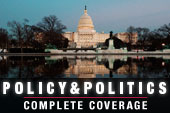Like so many presidents before him, Barack Obama laid out a grand vision for the nation in his inaugural address four years ago. After taking the oath of office to become the first black president in U.S. history, Obama spoke of the many challenges the country faced – among them, “war against a far-reaching network of violence and hatred,” an economy that had been “badly weakened” and “a sapping of confidence across our land.”

Then, in the moment of his speech that’s being replayed the most leading up to Monday’s second inaugural address, he spoke about the disappointing dysfunction of the political system meant to lead the way in meeting those challenges.
“On this day, we gather because we have chosen hope over fear, unity of purpose over conflict and discord,” he said. “On this day, we come to proclaim an end to the petty grievances and false promises, the recriminations and worn-out dogmas that for far too long have strangled our politics. We remain a young nation, but in the words of Scripture, the time has come to set aside childish things.”
Click here to view our photo gallary of images from the 2009 Inauguration.We know how that worked out. As much as anything, Obama’s first term was defined by the grinding political battles on everything from his stimulus plan to health care reform to raising the federal government’s borrowing limit.
We know how that worked out. As much as anything, Obama’s first term was defined by the grinding political battles on everything from his stimulus plan to health care reform to raising the federal government’s borrowing limit.Now, as the president enters his second term, the storyline surrounding this inauguration is in many ways more about what it won’t be than what it will: It won’t be an historic first. It won’t be a new beginning. It won’t be a record crowd. And it won’t be filled with the same sense of optimism that, briefly at least, extended even to some on the opposite side of the political aisle before crumbling back into familiar divisions.
Obama certainly has a long to-do list for the next four years: the debt limit, gun control, immigration…. Oh, and while we don’t hear much about it these days, the unemployment rate remains at 7.8 percent. But as he seeks to set the tone for the next four years, Obama’s approach to dealing with the Republicans who control the House may be as important to cementing his legacy as any of those policy initiatives.
Obama has been fond of chastising the opposition and opining openly about why they can’t seem to get to “yes” with him. At a December 31 press conference purportedly meant to signal progress in the fiscal cliff negotiations, he couldn’t help but work in some potshots that raised the ire of Republicans. Will he chastise them again on an even larger stage? Or will he, as has been reported, look to make a lofty call for unity similar to the one from 2009?
The words and tone will matter, but after the pomp and circumstance, the soaring rhetoric and stirring promises, it remains to be seen how Obama will actually govern. The rhetoric of comity used in inaugural addresses doesn't always comport with a president's actual behavior. Thomas Jefferson famously used his first inaugural address to tell a divided body politic that, “We are all Republicans, we are all Federalists.” He then went on to govern like a Republican.
Whether and how Obama confronts those who have challenged his agenda may signal much about the next four years. But even if he repeats his call for unity from fours years ago – or reminds the nation, as he memorably told the Democratic National Convention eight and a half years ago that “there's not a liberal America and a conservative America; there's the United States of America” – a weary public, a cynical press corps and, if it’s even possible, a more cynical political establishment will need to see it to believe it.





